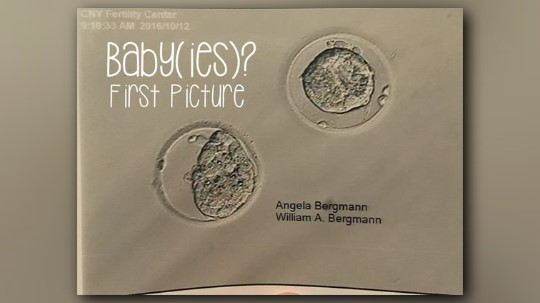Angie Bergmann knew her pregnancy was over on the way to the hospital.
At almost seven weeks pregnant, she was bleeding heavily and knew the signs of a miscarriage too well. Hours later an ultrasound confirmed her fears.
"The doctor is looking (at the screen) and he is looking at me, and I was like 'nothing is there, right?'" she said, adding, "You can’t sugarcoat this with women going through infertility, we know what we should see on the ultrasound."
Angie and her husband, Bill, have been trying to conceive for nine years. Over the past few years, Angie's been through three rounds of in vitro fertilization, a process where a mature egg is collected from the ovaries and fertilized by sperm in a lab. The fertilized egg, which is called an embryo, is later implanted in the uterus.
“My whole plan was I would have kids by 24," she said. "We all make those crazy plans in how our life is going to be and it doesn’t always work out that way.”
Across the U.S., one in eight couples experiences infertility. For those who need IVF treatments, the cost is many times prohibitive with one round costing as much as $15,000 in some cases, and insurance only covering the treatment in a few states. For Angie, who lives in Ohio, the most cost-effective solution was to travel to Central New York to a clinic that offered the service at a lower cost than those in her area.
Angie, who has unexplained infertility, which affects 30% of couples tested for infertility, said she was crestfallen when she learned she needed IVF.
“I was basically devastated because I knew that IVF wasn’t covered on our health insurance and ... at that time we made significantly less money than we do now,” she said. “I did a whole lot of research to find someplace I could save up the money to do an IVF treatment.”
Angie said she and her husband save around $10,000 per round of IVF by going across state lines.
After her most recent frozen embryo transfer, Angie felt the need to urinate often, felt bloated and nauseous, side effects of pregnancy.
“I want to stay feeling this way — this is what I am paying for, but knowing that I feel pregnant without necessarily being pregnant is not necessarily the best feeling in the world,” she said.
And when it doesn’t work out, the impact is devastating. Angie felt the effects of her most-recent miscarriage for most of December, and she admits that during her darkest times she wondered if it was worth it to try again.
"I know that if I don't try again I will wonder, well that could have been the time," she said.
The psychological effect of infertility on a woman is "extremely profound," according to Alice Domar, executive director of the Domar Center for Mind/Body Health and the Director of Integrative Care at Boston IVF.
Domar said a paper she published 20 years ago, found women with infertility had the same level of anxiety and depression as women with cancer, HIV or heart disease.
She said today simply signing on Facebook and seeing the posts of ultrasounds and babies that others are having can make women who are experiencing infertility feel isolated or unaware that others are going through the same experience.
“Way more people have infertility than you’d expect, but they don’t post,” Domar said. “There is nothing to post. What are you going to do post, a picture of your negative pregnancy test? Post a picture of your ultrasound after you miscarry? There is nothing to post when you are going through infertility.”
Angie notes that she would likely opt for adoption, if she didn't have 26 embryos left from an earlier transfer.
"I get to a point where I feel OK most days and and wonder why would I want to rip that bandaid back off, but then I see a pregnant women or a baby and say that's why," she said.
Angie, who is a local support group leader and also a vice co-chair for RESOLVE's infertility day, said she’s found comfort in sharing her story with others going through the same experience, which isn’t something everyone can understand.
“I recognize that what I am going through is a grieving process; I explain that to people who care about me who don’t understand that,” she said. “This isn’t just a flippant thing I am upset about; this is a real disease that I am dealing with that is impacting my life, and there is a process to this.”


